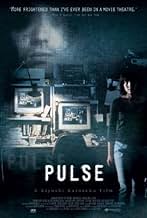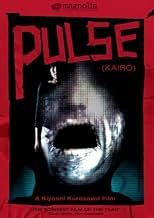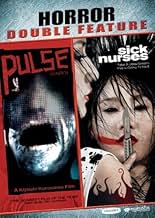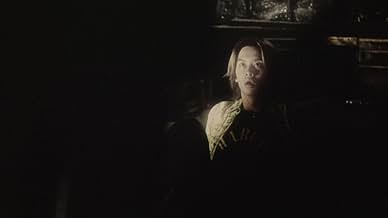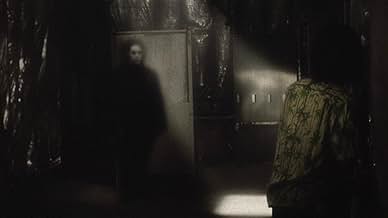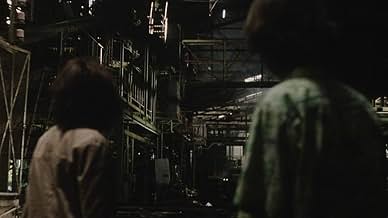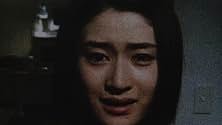लोगों के दो समूह ने सबूत खोजें हैं जो संकेत देते हैं कि आत्माएं इंटरनेट के माध्यम से मानव दुनिया मे घुसपैठ करने की कोशिश कर सकती हैं.लोगों के दो समूह ने सबूत खोजें हैं जो संकेत देते हैं कि आत्माएं इंटरनेट के माध्यम से मानव दुनिया मे घुसपैठ करने की कोशिश कर सकती हैं.लोगों के दो समूह ने सबूत खोजें हैं जो संकेत देते हैं कि आत्माएं इंटरनेट के माध्यम से मानव दुनिया मे घुसपैठ करने की कोशिश कर सकती हैं.
- पुरस्कार
- 3 जीत और कुल 3 नामांकन
फ़ीचर्ड समीक्षाएं
I love Takefumi Haketa's score - sometimes disquieting, sometimes sorrowful, but always lending substantially to the mood in the film. I love the haunting atmosphere that pervades the feature, cemented with scenes of desolation - empty buildings and streets.
I wish I had more concrete praise to offer.
There's a vague theme about not giving in to despair and loneliness, as such surrender is the real killer. This thematic content is stronger than any specific sense of narrative - which seems backwards, but here we are. For as much as the Internet is emphasized in one way or another, it's nothing more than a starting point for the plot. For as much as red tape is emphasized, it doesn't seem to serve any actual function in-universe, and therefore none in the plot. And because a few different ideas seem to be put forth, it's unclear why events transpire in the first place. The netherworld is the embodiment of loneliness, maybe? Ghosts want to pass into the real world from the netherworld - because the real world is inherently not lonely, maybe? Ghosts and humans can't coexist in the same space, maybe? Ghosts want to make friends, maybe?
I can abide narrative that is disordered, weak, minimized, or scarce - but I do generally require narrative of some kind in a movie, or some overarching unifying quality. Unless... is that lingering ambiguity the whole point? Is the lack of clarity about what is happening, or why, the other side of the coin to the looming air in the picture of nervous foreboding?
I've only seen a few other Kiyoshi Kurosawa features, but I greatly enjoyed those that I have. I began watching 'Pulse' with high expectations, and I'm sad to say I'm let down. I don't think it's outright bad, but I want to like it much more than I do. The great atmosphere and music keep the film aloft while deeply indistinct writing prevents it from achieving greater heights. Why, as if to accentuate the very difficulty I'm having - I note two blurbs from critics who, speaking from opposite perspectives, still had the same conclusion. Stephen Hunter, for The Washington Post, wrote a positive review in saying "'Pulse' is best enjoyed if it's not questioned too closely. It lives visually in a way it cannot live intellectually." In a nearly identical remark, Jeff Shannon's critical review for The Seattle Times observed "While it's rattling your nerves, 'Pulse' leaves your brain wanting more."
I don't know anything about ghosts, but 'Pulse' definitely exists in a liminal space between life and death. Or is that uncertainty also wholly intentional?
Obviously many other people have gotten more out of this than I have; I'm glad for them. Perhaps given more time and consideration I'll turn a corner and regard 'Pulse' more highly. As it is, much to my disappointment, I'm just unsatisfied.
I wish I had more concrete praise to offer.
There's a vague theme about not giving in to despair and loneliness, as such surrender is the real killer. This thematic content is stronger than any specific sense of narrative - which seems backwards, but here we are. For as much as the Internet is emphasized in one way or another, it's nothing more than a starting point for the plot. For as much as red tape is emphasized, it doesn't seem to serve any actual function in-universe, and therefore none in the plot. And because a few different ideas seem to be put forth, it's unclear why events transpire in the first place. The netherworld is the embodiment of loneliness, maybe? Ghosts want to pass into the real world from the netherworld - because the real world is inherently not lonely, maybe? Ghosts and humans can't coexist in the same space, maybe? Ghosts want to make friends, maybe?
I can abide narrative that is disordered, weak, minimized, or scarce - but I do generally require narrative of some kind in a movie, or some overarching unifying quality. Unless... is that lingering ambiguity the whole point? Is the lack of clarity about what is happening, or why, the other side of the coin to the looming air in the picture of nervous foreboding?
I've only seen a few other Kiyoshi Kurosawa features, but I greatly enjoyed those that I have. I began watching 'Pulse' with high expectations, and I'm sad to say I'm let down. I don't think it's outright bad, but I want to like it much more than I do. The great atmosphere and music keep the film aloft while deeply indistinct writing prevents it from achieving greater heights. Why, as if to accentuate the very difficulty I'm having - I note two blurbs from critics who, speaking from opposite perspectives, still had the same conclusion. Stephen Hunter, for The Washington Post, wrote a positive review in saying "'Pulse' is best enjoyed if it's not questioned too closely. It lives visually in a way it cannot live intellectually." In a nearly identical remark, Jeff Shannon's critical review for The Seattle Times observed "While it's rattling your nerves, 'Pulse' leaves your brain wanting more."
I don't know anything about ghosts, but 'Pulse' definitely exists in a liminal space between life and death. Or is that uncertainty also wholly intentional?
Obviously many other people have gotten more out of this than I have; I'm glad for them. Perhaps given more time and consideration I'll turn a corner and regard 'Pulse' more highly. As it is, much to my disappointment, I'm just unsatisfied.
A group of young people in Tokyo begin to experience strange phenomena involving missing co-workers and friends, technological breakdown, and a mysterious website which asks the compelling question, "Do you want to meet a ghost?"
Director Kiyoshi Kurosawa spent years working in the world of "pink" films and direct-to-video movies. He was at this time best known in the west for "Cure" (1997), though it was "Pulse" that would make him an international sensation. Assisting him is cinematographer Junichiro Hayashi, known for two other J-horror modern classics, "Ring" and "Dark Water".
"Pulse" was released at the right time for American audiences to latch on to. The American version of "The Ring" came out in 2002, and sparked a wider interest in Japanese horror, kicking off a wave of remakes. This also helped get the originals a wider distribution in the States -- "Pulse" being among those, as well as "Audition" and many of the Takashi Miike films that had previously been very niche.
Kurosawa uses this film not just to tell a good ghost story, but to explore "the horror of isolation" in a world of increased inter-connectivity. With its dreary, depressing color palette and empty space, we find this story about the Internet to truly be about loneliness. Whether intentional or not, it is a clever social commentary that may be more true today (2017) than it was at the time.
Some early reviews were critical because the film is heavier on style than substance and the narrative is not completely coherent. But since then, praise has only grown. In 2012, Jaime Christley of Slant magazine listed the film as one of the greatest of all time. In the early 2010s, Time Out conducted a poll with several authors, directors, actors and critics who have worked within the horror genre to vote for their top horror films. "Pulse" placed at number 65 on their top 100 list.
The Arrow Video Blu-ray is a fine package and a great excuse to re-visit this film. Contents include (but are not limited to) new interviews with writer/director Kiyoshi Kurosawa (at an astounding 43 minutes!), actor Show Aikawa and cinematographer Junichiro Hayashi (24 minutes); "The Horror of Isolation", a new video appreciation featuring Adam Wingard and Simon Barrett; an archive 'making of' documentary, plus four archive behind-the-scenes featurettes.
Director Kiyoshi Kurosawa spent years working in the world of "pink" films and direct-to-video movies. He was at this time best known in the west for "Cure" (1997), though it was "Pulse" that would make him an international sensation. Assisting him is cinematographer Junichiro Hayashi, known for two other J-horror modern classics, "Ring" and "Dark Water".
"Pulse" was released at the right time for American audiences to latch on to. The American version of "The Ring" came out in 2002, and sparked a wider interest in Japanese horror, kicking off a wave of remakes. This also helped get the originals a wider distribution in the States -- "Pulse" being among those, as well as "Audition" and many of the Takashi Miike films that had previously been very niche.
Kurosawa uses this film not just to tell a good ghost story, but to explore "the horror of isolation" in a world of increased inter-connectivity. With its dreary, depressing color palette and empty space, we find this story about the Internet to truly be about loneliness. Whether intentional or not, it is a clever social commentary that may be more true today (2017) than it was at the time.
Some early reviews were critical because the film is heavier on style than substance and the narrative is not completely coherent. But since then, praise has only grown. In 2012, Jaime Christley of Slant magazine listed the film as one of the greatest of all time. In the early 2010s, Time Out conducted a poll with several authors, directors, actors and critics who have worked within the horror genre to vote for their top horror films. "Pulse" placed at number 65 on their top 100 list.
The Arrow Video Blu-ray is a fine package and a great excuse to re-visit this film. Contents include (but are not limited to) new interviews with writer/director Kiyoshi Kurosawa (at an astounding 43 minutes!), actor Show Aikawa and cinematographer Junichiro Hayashi (24 minutes); "The Horror of Isolation", a new video appreciation featuring Adam Wingard and Simon Barrett; an archive 'making of' documentary, plus four archive behind-the-scenes featurettes.
What could have been just another RING rip-off turns out to be one of the most thought-provoking and genuinely eerie films I've seen come out of Japan: it's a film in which the door between the living and the dead is accidentally opened, leading to all manner of sinister events as it transpires that the dead are returning to Earth.
Like most J-horrors of the past decade, PULSE is a slow burner that moves almost glacially, gradually slotting in the various pictures of the jigsaw as its final game plan becomes apparent. Saying too much would spoil the intriguing, dream-like narrative, suffice to say that this is a film that doesn't disappoint at any stage during its progress. The 'ghost' segments are supremely creepy and disturbing, countered neatly by shock suicide scenes and a clever bit of FX involving a plane that was later cribbed for Alex Proyas's Hollywood movie KNOWING.
The cast give typically understated performances that increase in intensity as the character list is gradually whittled down, leading to one heck of a grim climax. Altogether, I can't fault the direction, writing, acting as all three combine to deliver an imaginative and thoughtful ghost story that's extremely different from most of what's come before.
Like most J-horrors of the past decade, PULSE is a slow burner that moves almost glacially, gradually slotting in the various pictures of the jigsaw as its final game plan becomes apparent. Saying too much would spoil the intriguing, dream-like narrative, suffice to say that this is a film that doesn't disappoint at any stage during its progress. The 'ghost' segments are supremely creepy and disturbing, countered neatly by shock suicide scenes and a clever bit of FX involving a plane that was later cribbed for Alex Proyas's Hollywood movie KNOWING.
The cast give typically understated performances that increase in intensity as the character list is gradually whittled down, leading to one heck of a grim climax. Altogether, I can't fault the direction, writing, acting as all three combine to deliver an imaginative and thoughtful ghost story that's extremely different from most of what's come before.
This film starts out well, doing all the right stuff. It had me going for awhile.
But it get's slower, and slower, and slower--not to mention murkier. It is one of those films that would have worked fine as a 90 minute movie--even with some flaws.
But , anyway, this film goes on for about two hours, long after the viewer's interest has begun to wander and you've started scratching your head, wondering exactly what is happening.
Toward the end it kind of degenerates into overly long scenes of people running around in blasted, derelict industrial buildings breathing very hard into their microphones and shouting uninspired, predictable dialogue.
Some things just aren't very dramatic. Longish scenes of people poking around in pretty much abandoned industrial settings looking for stuff and breathing hard into their microphones isn't dramatic.
By the end, we are working our way through a checklist of horror movie clichés in excruciatingly slow motion. Ancient horror movie clichés have to be executed with a certain cleverness, a certain panache, and perhaps a little inventive camera work/cutting. Some snappy dialogue, some attitude. Or maybe you just have to get them out of the way fast. That's not what happens in this film.
The premise is rather interesting, but some of the exposition kind of conflicts with the stated premise--unless the stated premise was a red-herring. It's hard to tell from what they give you on screen and the film didn't motivate me to try to figure it out.
So, nice idea, good start ... really, really slow, pretty much unimaginative ending.
Maybe if they had had a bigger special effects budget ...
But it get's slower, and slower, and slower--not to mention murkier. It is one of those films that would have worked fine as a 90 minute movie--even with some flaws.
But , anyway, this film goes on for about two hours, long after the viewer's interest has begun to wander and you've started scratching your head, wondering exactly what is happening.
Toward the end it kind of degenerates into overly long scenes of people running around in blasted, derelict industrial buildings breathing very hard into their microphones and shouting uninspired, predictable dialogue.
Some things just aren't very dramatic. Longish scenes of people poking around in pretty much abandoned industrial settings looking for stuff and breathing hard into their microphones isn't dramatic.
By the end, we are working our way through a checklist of horror movie clichés in excruciatingly slow motion. Ancient horror movie clichés have to be executed with a certain cleverness, a certain panache, and perhaps a little inventive camera work/cutting. Some snappy dialogue, some attitude. Or maybe you just have to get them out of the way fast. That's not what happens in this film.
The premise is rather interesting, but some of the exposition kind of conflicts with the stated premise--unless the stated premise was a red-herring. It's hard to tell from what they give you on screen and the film didn't motivate me to try to figure it out.
So, nice idea, good start ... really, really slow, pretty much unimaginative ending.
Maybe if they had had a bigger special effects budget ...
I really like the slow and ominous atmosphere of Kairo, especially its depiction of Japan's late 90s and early 2000s aesthetics, including early internet culture and architectural design. The film features some excellent decor shots that enhance its eerie and nostalgic feel.
Fun fact: Kiyoshi Kurosawa, known for his work in horror, actually started his career directing pink films, which are a genre of Japanese softcore adult movies. This diverse background contributed to his unique approach to creating tension and atmosphere in his later works.
I give this film a 6/10 mostly because i love the aesthetics from the early 2000s.
-Concept (Idea Premise, Worldbuilding, Theme) 7.0 -Plot (A,B,C, Writing) 6.0 -Acting 5.8 -Dialogue(Character development, Plot advancement, Natural-sounding, Consistency, Looping(ADR)) 5.6 -Fun 5.2 -Decor (Aesthetic, Graphics VFX, Scenery/Location, Scenes, Shots, Stage Set, Mise en Scène, Directing) 8.2 -Overall 6.3.
Fun fact: Kiyoshi Kurosawa, known for his work in horror, actually started his career directing pink films, which are a genre of Japanese softcore adult movies. This diverse background contributed to his unique approach to creating tension and atmosphere in his later works.
I give this film a 6/10 mostly because i love the aesthetics from the early 2000s.
-Concept (Idea Premise, Worldbuilding, Theme) 7.0 -Plot (A,B,C, Writing) 6.0 -Acting 5.8 -Dialogue(Character development, Plot advancement, Natural-sounding, Consistency, Looping(ADR)) 5.6 -Fun 5.2 -Decor (Aesthetic, Graphics VFX, Scenery/Location, Scenes, Shots, Stage Set, Mise en Scène, Directing) 8.2 -Overall 6.3.
क्या आपको पता है
- ट्रिवियाTakashi Miike has said that this is the only film that has frightened him as an adult.
- गूफ़Ryosuke is typing in a numerical password to log in to his computer to watch videos on the dark web as shown on his screen. When it cuts to a shot of him typing on his keyboard however, he is pressing letters instead of numbers.
- भाव
Ghost: Death was... eternal loneliness.
- इसके अलावा अन्य वर्जनRemade in America with the same (English) title, starring Kristen Bell, in 2006.
- साउंडट्रैकHane Lay Down My Arms
Performed by Cocco
टॉप पसंद
रेटिंग देने के लिए साइन-इन करें और वैयक्तिकृत सुझावों के लिए वॉचलिस्ट करें
- How long is Pulse?Alexa द्वारा संचालित
विवरण
बॉक्स ऑफ़िस
- US और कनाडा में सकल
- $51,420
- US और कनाडा में पहले सप्ताह में कुल कमाई
- $7,250
- 13 नव॰ 2005
- दुनिया भर में सकल
- $3,27,338
इस पेज में योगदान दें
किसी बदलाव का सुझाव दें या अनुपलब्ध कॉन्टेंट जोड़ें







